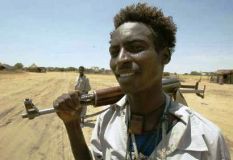Darfur rebels cast doubt on return to peace talks
By Nima Elbagir
KHARTOUM, Feb 18 (Reuters) – Rebels fighting in Sudan’s Darfur region have set conditions on a return to full-blown peace talks with the government, a rebel spokesman said on Friday, casting doubt on a deal reached a day earlier in Chad.

|
|
A member of Sudanese Liberation Army (SLA) walks with his rifle at Ashma village 30 km (19 miles) from Nyala, south Darfur, October 6, 2004.(Reuters). |
A statement after talks between two rebel groups and the Sudanese government in Chad’s capital N’Djamena on Thursday said the two sides had committed to restart peace talks in Nigeria’s capital Abuja, although no date was set.
However, a spokesman for the Sudan Liberation Army (SLA), the main rebel group in Darfur, said a return to the talks would depend on the government creating a “conducive atmosphere”.
“We agreed that the parties would go away and consult with the African Union separately to discuss a possible date for restarting the talks but that would be dependent on the government of Sudan implementing what was agreed upon,” SLA spokesman Adam Ali Shogar said by phone from N’Djamena.
Thursday’s statement called for the two sides to take part in the next round of peace talks in Abuja at the highest level and with no preconditions.
Allam-Mi Ahmad, a senior Chadian mediator, said there was no doubt talks would resume, possibly within the next two weeks.
“The two rebel movements have never refused to go to Abuja. They have set preconditions, respected by the Sudanese government. The resumption of the peace talks is a done deal,” he told Reuters.
But Shogar said the Sudanese government had to withdraw from all the areas it took after Sept. 8, the date of an oft-violated ceasefire agreement, and respect a no-fly zone before the rebels would consider a return to the negotiating table.
“Two days ago we had a sighting of a government Antonov in North Darfur State, so it is obvious that the government is not respecting its commitments. When the government delivers on these commitments then we will set a date for talks,” he said.
VILLAGES STILL BURN
An African Union source told Reuters four villages had been burnt between Wednesday and Friday by Arab Janjaweed militias in Duma, 40 km (25 miles) north of Nyala, the capital of South Darfur State.
“Some 150 houses were destroyed, they were still burning today when we arrived,” said the AU source, who declined to be named.
In New York, U.N. aid chief Jan Egeland warned Darfur faces a new threat of famine if the fighting does not stop.
He said aid workers, relief helicopters and food trucks are all under fire from government forces, rebel troops and militia fighters.
“Humanitarian workers are frustrated and angry with the situation. Many of them feel that we are alibis or a substitute for the political action and the security action that the world is not taking,” he said.
As many as 4 million people may soon be in desperate need of life-saving assistance, he said.
After years of tribal conflict over scarce resources, Darfur’s rebels took up arms in February 2003, accusing Khartoum of neglect and giving preferential treatment to Arab tribes.
The government is accused of mobilising the Janjaweed to loot and burn non-Arab villages. The government says it recruited militias to fight the rebellion but not the Janjaweed, whom it has called outlaws.
On Wednesday, U.N. Secretary-General Kofi Annan urged the U.N. Security Council to take immediate steps to stop the Darfur war, which has killed at least 70,000 people since last March and displaced 2 million.
Western observers fear that the rebel demands will further delay efforts to resolve the crisis.
“Whilst the government needs to establish a proven track record on Darfur, the (rebels) themselves need to set out clear and reasonable demands if negotiations are to move forward,” a Western observer said.
“They also have a clear responsibility to contribute to a conducive atmosphere for talks by living up to their own commitments,” he said.
(additional reporting by Betel Miarom in N’Djamena)
